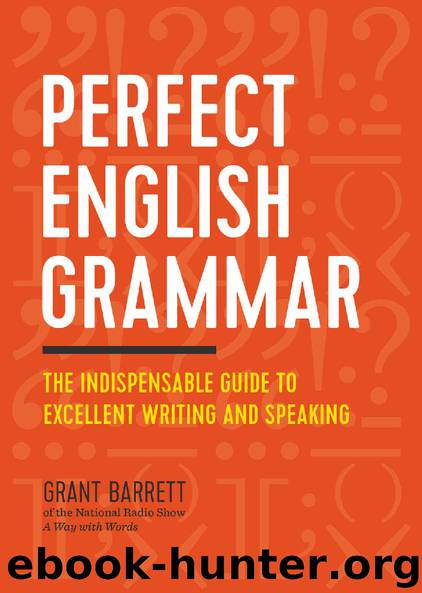Perfect English Grammar: The Indispensable Guide to Excellent Writing and Speaking by Grant Barrett

Author:Grant Barrett [Barrett, Grant]
Language: eng
Format: epub, mobi
Publisher: Zephyros Press
Published: 2016-03-29T00:00:00+00:00
8.1 Compound Nouns
Sometime nouns appearing together, or even with other parts of speech, become idiomatic compound nouns, so that they travel in the language together. By idiomatic I mean they behave as a unit and, to a lesser or greater degree, amount to more than the sum of their parts.
■ ice cream ■ coffee shop ■ courthouse ■ football ■ payday ■ well-being ■ Johnny-come-lately ■ mother-in-law The first two examples above are called open compounds, as there is a space between the words. The third and fourth are closed compounds: the space between the words has been removed, but we still have an understanding of each half as an independent word that contributes its own meaning. The last two are hyphenated. As you can see, in some cases a compound includes more than two words.
Especially in North American English, the slow trend is for more compounds to be closed, and for far fewer hyphenated forms to be used, even over recent decades. Among style guides and dictionaries, you will find wide variability. For example, these are the preferred forms of several related compounds from a bunch of different dictionaries.
■ firebomb ■ fire drill ■ fire extinguisher/fire-extinguisher ■ firefighter ■ fire hose ■ firehouse ■ fire-sale/fire sale ■ fire truck ■ firewall Compounds made with two or more nouns are far more likely to be closed. In many cases, the first noun of a compound began as an attributive noun, which acts like an adjective in describing the second noun of the pair.
■ daybed ■ houseboat ■ toothpaste If the compound is made out of an adjective and a noun, it is unlikely to be hyphenated.
■ middle class ■ full moon ■ black eye If the last word in the compound is obviously derived from a verb, and refers to a person who does a specific type of thing, then you can often use a hyphen, especially if the word is not very common.
■ fire-breather ■ fire-walker ■ fire-watcher If any of the words in the compound are the -ing form of a verb, it is likely to be an open compound.
■ driving school ■ dry cleaning ■ swimming pool This is one of those rare cases where you may be able to trust your spellchecker (spell-checker?), because at least it will be consistent and not out on the forefront of closing compounds and eliminating hyphens. Also, as you read more, you’ll begin to absorb which is correct for which words.
The widespread decrease of hyphenation is unfortunate, as it is very much needed in some modifying compounds. For example, the difference between these two is made clearer: ■ Good: new hat-seller = The person who sells hats is new to the job.
■ Good: new-hat seller = The person sells new hats.
■ Bad: new hat seller = More context is needed to understand the exact meaning.
These are not academic distinctions, either, but widespread difficulties caused by the absence of hyphenation. Take this wording from a box of plastic bags my wife
Download
Perfect English Grammar: The Indispensable Guide to Excellent Writing and Speaking by Grant Barrett.mobi
This site does not store any files on its server. We only index and link to content provided by other sites. Please contact the content providers to delete copyright contents if any and email us, we'll remove relevant links or contents immediately.
Cecilia; Or, Memoirs of an Heiress — Volume 1 by Fanny Burney(32544)
Cecilia; Or, Memoirs of an Heiress — Volume 2 by Fanny Burney(31942)
Cecilia; Or, Memoirs of an Heiress — Volume 3 by Fanny Burney(31928)
The Lost Art of Listening by Michael P. Nichols(7488)
Asking the Right Questions: A Guide to Critical Thinking by M. Neil Browne & Stuart M. Keeley(5757)
We Need to Talk by Celeste Headlee(5608)
On Writing A Memoir of the Craft by Stephen King(4928)
Dialogue by Robert McKee(4386)
Pre-Suasion: A Revolutionary Way to Influence and Persuade by Robert Cialdini(4218)
I Have Something to Say: Mastering the Art of Public Speaking in an Age of Disconnection by John Bowe(3872)
Elements of Style 2017 by Richard De A'Morelli(3339)
The Book of Human Emotions by Tiffany Watt Smith(3300)
Fluent Forever: How to Learn Any Language Fast and Never Forget It by Gabriel Wyner(3077)
Name Book, The: Over 10,000 Names--Their Meanings, Origins, and Spiritual Significance by Astoria Dorothy(2978)
Why I Write by George Orwell(2944)
Good Humor, Bad Taste: A Sociology of the Joke by Kuipers Giselinde(2941)
The Art Of Deception by Kevin Mitnick(2796)
The Grammaring Guide to English Grammar with Exercises by Péter Simon(2737)
Ancient Worlds by Michael Scott(2682)
